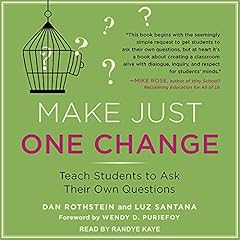
Punished by Rewards
The Trouble with Gold Stars, Incentive Plans, A's, Praise, and Other Bribes
No se pudo agregar al carrito
Add to Cart failed.
Error al Agregar a Lista de Deseos.
Error al eliminar de la lista de deseos.
Error al añadir a tu biblioteca
Error al seguir el podcast
Error al dejar de seguir el podcast
 Exclusivo para miembros Prime: ¿Nuevo en Audible? Obtén 2 audiolibros gratis con tu prueba.
Exclusivo para miembros Prime: ¿Nuevo en Audible? Obtén 2 audiolibros gratis con tu prueba.Compra ahora por $23.52
-
Narrado por:
-
Alfie Kohn
-
De:
-
Alfie Kohn
The basic strategy we use for raising children, teaching students, and managing workers can be summarized in six words: Do this and you'll get that. We dangle goodies (from candy bars to sales commissions) in front of people in much the same way we train the family pet.
Drawing on a wealth of psychological research, Alfie Kohn points the way to a more successful strategy based on working with people instead of doing things to them. "Do rewards motivate people?" asks Kohn. "Yes. They motivate people to get rewards." Seasoned with humor and familiar examples, Punished by Rewards presents an argument unsettling to hear but impossible to dismiss.
©1993 Alfie Kohn (P)2017 TantorLos oyentes también disfrutaron:




















Reseñas de la Crítica
Las personas que vieron esto también vieron:






Skeptical at first, I've been won over
Se ha producido un error. Vuelve a intentarlo dentro de unos minutos.
Validating.
Se ha producido un error. Vuelve a intentarlo dentro de unos minutos.
It’s a must
Se ha producido un error. Vuelve a intentarlo dentro de unos minutos.
A necessity for any teacher, that is, anyone
Se ha producido un error. Vuelve a intentarlo dentro de unos minutos.
A listen for every parent and teacher
Se ha producido un error. Vuelve a intentarlo dentro de unos minutos.


